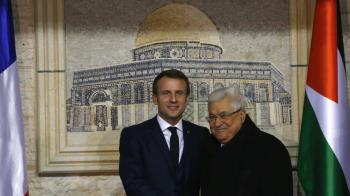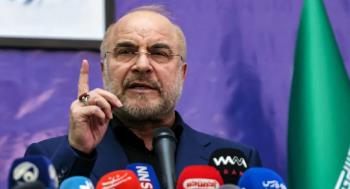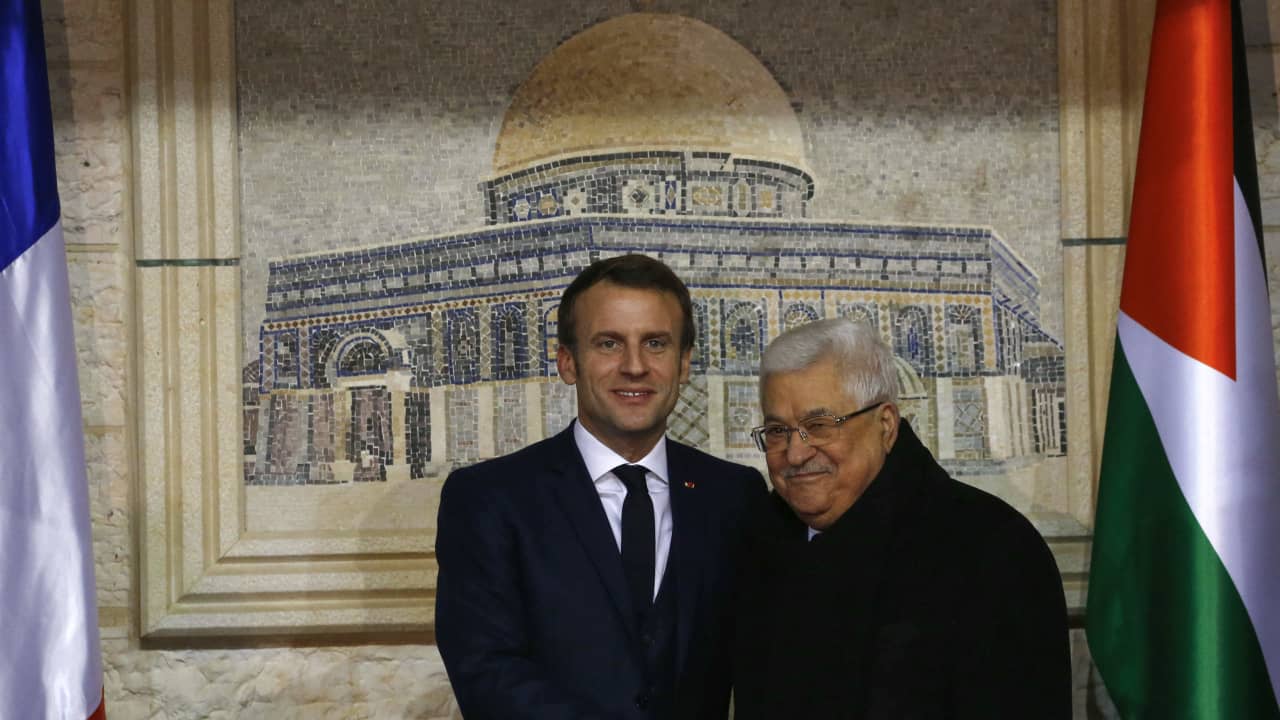Alwaght- Amid the world pressures for an end to the catastrophic Gaza situation and the Israeli defiance, in a significant development the French government has recently said that it will recognize independent Palestinian state officially in the near future.
In this report, we bring into the spotlight the French aims behind pursuing this policy and its international effects on the Palestinian case. Will France be the initiator of a new wave for recognition of the Palestinian state among other Western countries? Will this decision trigger a development on the reality of occupation of Palestinian land? And finally, what geopolitical changes are ahead driven by this decision?
From Macron’s message to New York conference
The initial whispers about the new French decision were first heard in the heart of the occupied territories. On July 24, the French Consul General in Al-Quds (Jerusalem) Nicolas Kassianides delivered to the Palestinian Authority President Mahmoud Abbas President Emmanuel Macron's letter about Paris plan to recognize Palestinian state by September. The day after, Macron posted on X: “France, in line with its historic commitment to achieving a just and lasting peace in the Middle East, has decided to recognize Palestine… There is no alternative to this action.”
He added that this decision is meant to simultaneously secure Israel and the Palestinian right to self-determination. He called for demilitarization of the Palestinian state and recognition of the Israeli regime.
Later, during a meeting between Saudi Foreign Minister Prince Faisal bin Farhan and his French counterpart, Jean-Noël Barrow, the two sides announced their joint decision to hold an international conference at the United Nations.
The conference will be held in New York on July 28-29, and aims to work out a roadmap for the formation of a Palestinian state based on a two-state solution. The event had previously been postponed due to the Israeli-Iranian war.
Paris reasons and motivations: Why now?
France is a country that historically in line with other Western countries has been the supporter of the strategic interests and security of the Israeli regime as during the Arab-Israeli wars and the Israeli confrontations with the Axis of Resistance, Paris has been the constant part of the West’s military, diplomatic, media, and logistics support for Tel Aviv. Therefore, regardless of the extent of its impact on geopolitical developments and the extent of Paris’ support for the Palestinians, the recent change was understood in the context of the following developments:
First; the internal developments in France and the political and propaganda exploitation of the Macron government’s announcement of support for the establishment of a Palestinian state. In fact, one of the main motivations of the Macron government is related to the pressure of public opinion and his need to win the support of the large Muslim and leftist population of France on the eve of the upcoming parliamentary elections.
Macron was clearly under increasing pressure from domestic public opinion. The humanitarian crisis in Gaza and the daily news of the killing of civilians have triggered a wave of solidarity with the Palestinians in the French political and social circles. Massive demonstrations in Paris and other French cities, numerous calls to boycott Israel, and increased support for leftist and anti-Israeli parties all drove Macron’s decision. According to statistics, France, with a population of about 70 million, has nearly 9 million Muslims, making Islam the second largest religion after Christianity in the country. Attracting the support of this population could be a key factor in changing the fate of the upcoming elections, especially since raising the issue of Palestine, given the negative positions of the right-wing towards Muslims and immigrants and the anti-Israeli protests, could create a powerful media front against the right-wing parties.
In the past few days, Macron’s policy has shown its desired results, and most left-wing parties have turned to supporting the Macron government. Jean-Luc Mélenchon, the leader, and Manuel Bompar, the coordinator of the radical left party “ La France Insoumise ”, Marine Tondellier, the secretary general of the Green Party, Fabien Roussel, the secretary general of the Communist Party, and Olivier Faure, the first secretary of the Socialist Party, are among the prominent figures of the French left who have explicitly adopted positions of support for the French government’s decision.
The second motivation of Paris should also be sought in the effort to redefine France’s position in the geopolitical competition with the US in the Arab world and in West Asia. In addition to striving for independence and reducing Europe’s military and economic dependence on the US, French foreign policy under the Macron government also emphasizes restoring the country’s position and strengthening Paris’s political, military and economic foothold in the Arab world, West Asia and the geostrategic region of the Persian Gulf. In the meantime, given the widespread unhappiness of public opinion and Islamic governments with Washington’s staunch support for Israel’s aggressive policies and occupation towards the Palestinians and neighboring countries, and especially the genocide in Gaza, a different approach by Paris to the Palestinian cause represented by Palestinian state recognition could be the key to restoring France’s influence and position in the region.
World support and Palestinian happiness
The Macron government’s prediction about gaining international support to the plan to recognize Palestinian state fast materialized and a massive wave of support began to pour to Paris.
On the Palestinian side, Palestinian Authority Deputy President Hussein al-Sheikh praised France for its “historic” stance, noting that the move reaffirmed Paris’ commitment to international law and the Palestinians’ right to self-determination.
Hamas also welcomed the decision, calling it a qualitative shift in international positions and support for the justice of the Palestinian cause, stressing that it demonstrated the occupiers’ failure to distort the facts.
Saudi Arabia, for its part, described the decision as “historic,” stating that it reaffirmed the international consensus to support the legitimate rights of the Palestinian people, and called on other countries to follow in France’s footsteps.
Jordan described the announcement as “a step in the right direction” that would help achieve a two-state solution.
Egypt welcomed the decision, calling it “an important and historic change,” and calling on all countries to recognize the state of Palestine.
On the other hand, the (Persian) Gulf Cooperation Council, through its Secretary-General, Jassim Al-Badawi, commended the French decision and called on the international community to take similar steps to achieve a comprehensive and just peace.
Qatar and Kuwait expressed their full support for the French move, considering it in accordance with international legitimacy resolutions and the Arab Peace Initiative.
Among non-Muslim leaders, Spanish Prime Minister Pedro Sanchez welcomed the French action and stated that he supported the two-state solution. Canada, too, backed this French position and confirmed that it would work in all international forums to ensure its success.
American and Israeli anger and fear
As predicted, the French move did not appeal to the US and Israeli officials. The Israeli fury was so serious that all Israeli officials began to threaten the Palestinians and vowed to counter any plans for formation of an independent Palestinian state.
Netanyahu, who is wanted by the International Criminal Court for war crimes in Gaza and has repeatedly clashed with the leaders of the Elysee Palace in recent months over Paris’s call to stop the war in Gaza, condemned the French decision, saying that the move was “a reward for terrorism and an existential threat to Israel.”
Israel’s Defense Minister, Yisrael Katz, who has been nicknamed the Minister of Hunger by the Palestinians, called Macron’s decision “a surrender to terrorism and a reward for Hamas,” adding: “We will not allow a Palestinian entity to be formed that threatens our security and existence.”
Israeli Deputy Prime Minister Yariv Levin, called the decision “a black spot in French history and direct support for terrorism,” and said: “Now is the time for Israeli sovereignty to be applied to the West Bank (which has been occupied since 1967).”
Similarly, former Prime Minister Naftali Bennett said that recognizing the state of Palestine after the October 7, 2023 attack was “not diplomacy, but a clear moral failure,” arguing that the decision sends a dangerous message: “Kill the Jews, and you will get a state.”
Avigdor Lieberman, leader of Yisrael Briteinu party, echoed the same sentiment, describing the decision as an encouragement to Hamas and a reward for “the most horrific massacre of Jews since the Holocaust.”
Meanwhile, the Israeli Settlement Council called on the government to respond by exercising sovereignty over the West Bank, stressing that “the time for action has come.”
Israeli media outlets, along with the regime’s officials, highlighted the so-called dangers of the French move. According to Itamar Eichner, political correspondent for Yedioth Ahronoth, Tel Aviv fears that France’s move, especially in light of the ongoing war on Gaza and growing international criticism of its policy towards the Palestinians, will further fuel a trend that is undermining its international legitimacy.
Eichner explained that Israel appears to be in a deep diplomatic standoff with countries that were once among its closest Western allies, promoting the image of its growing political isolation on the world stage at a time it suffers from deep internal political divisions.
Israel Hayom in a piece pointed to the growing international isolation of Israel in the light of the what it called “dangerous changes” in the West. These changes are manifested by Macron’s Palestinian state recognition and growing anti-Israeli policies of Britain and Europe.
But on the other side of the Atlantic and in Washington this American policy was met with strong opposition of the White House, with Secretary of State Mark Rubio saying that he “strongly” rejects Macron’s decision.
The White House described the French decision as “unwise” and will harm peace, and the American ambassador to Israel Mike Huckabee in an X post mocked Macron, saying: “French President Emmanuel “Macron’s unilateral ‘declaration’ of a ‘Palestinian’ state didn’t say where it would be. I can now exclusively disclose that France will offer the French Riviera & the new nation will be called ‘Franc-en-Stine.
What countries have so far recognized state of Palestine?
Almost 144 out of 192 members of the UN have already recognized Palestine as an independent state, including the Global South countries, China, Russia, and India.
In November 2012, the UN General Assembly approved the de facto recognition of Palestine as an independent state by upgrading Palestine’s status in the international organization from “observer” to “non-member state.”
Last year, in a significant development, three European countries – Ireland, Norway and Spain – recognized the state of Palestine. However, only a handful of the 27 EU member states, such as Sweden and Cyprus, still recognize the state of Palestine.
In fact, while European countries such as Spain, Ireland, Norway and Slovenia, and now France, have joined the list of countries recognizing Palestine, the position of the majority of European governments remains different and the reaction of major countries of Europe shows that they will not follow France’s new policy.
British Prime Minister Keir Starmer said on Friday that recognizing the state of Palestine must be part of a broader plan to ensure lasting security for Palestinians and Israelis.
Germany has also previously said it has no intention of recognizing a Palestinian state in the short term, stressing that its priority is to achieve the “expected progress” towards a two-state solution to live in peace.
Antonio Tajani, the foreign minister of Italy’s right-wing government, said that recognition of a Palestinian state should go hand in hand with recognition of Israel by the new state.
“The failure of a Palestinian state to recognize Israel means that the problem cannot be solved,” he added during a meeting in Rome.
Establishing Palestinian thanks to active resistance
The decision to recognize a Palestinian state is largely symbolic since a major part of the territories that under the two-state solution are recognized as the Palestinian territory are occupied by the Israeli regime.
France will be the first major European founding power of the European Union, the first G7 country, and the first permanent Western member of the Security Council to recognize Palestine.
This French move could further motivate the anti-Israeli movement in other European countries, but it remains to be seen whether the Macron government will stick to its slogans of taking practical steps to reduce the violation of Palestinian rights in the West Bank and Gaza, in particular by activating the stalled Security Council mechanism to confront illegal settlements and stop the war in Gaza as soon as possible and force the Israelis to lift the siege.
On the other hand, the French move, along with the support of other countries, could put the Netanyahu government, which is currently facing war crimes charges at the International Criminal Court and is under intense pressure from widespread domestic and foreign protests, on a shaky foundation.
However, one very important issue should not be ignored, and that is the effort of the French and some Arab governments that support compromise to Tel Aviv and normalization of Arab world relations with Israel to promote a role for the Fatah movement and gain credit for and rebuild the damaged image of the Palestinian Authority, led by Mahmoud Abbas, in the eyes of the Palestinian public.
The French government and Saudi Arabia tie the agreement for arranging the UN meeting on the two-state solution in New York to the determination of the Palestine situation after elimination of Hamas and resistance in Palestine and they have made themselves clear on this issue. This is while what is being tried to be put in the basket of legitimacy and credibility of the pro-compromise Palestinian Authority today is in fact the fruit of the sincere endeavor of the heroic Palestinian nation, led by the resistance movements, in 21 months of unequal war and the failure of the Israeli regime to achieve its goals.
It should be known that this French decision is taken in the middle of Gaza humanitarian catastrophe and 21 months of brave resistance of the Palestinian people, a resistance with empty hands and with reliance on the force of belief unseen by modern history. According to Gaza ministry of health, about 59,587 Palestinians were killed by Israeli invasion of the Palestinian enclave, mostly children and women, and hundreds of thousands were injured. A few families can be found not having a member killed. Some families were killed in Israeli bombing altogether.
Hunger, heat, cold, disease, and displacement have made war several times harder, but the people have not surrendered, resisted the Israeli and American pressures for relocation, and chose resistance until martyrdom or victory.
It was this brave and innocent resistance that raised the Palestinian flag across the world and at the heart of Europe and persuaded Western governments like Macron’s to join the global front for solidarity with Palestine to gain popularity, legitimacy, and geopolitical goals.



























